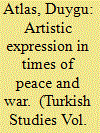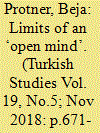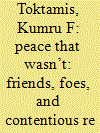|
|
|
Sort Order |
|
|
|
Items / Page
|
|
|
|
|
|
|
| Srl | Item |
| 1 |
ID:
161148


|
|
|
|
|
| Summary/Abstract |
This article traces the effect of the ‘Kurdish opening,’ which led to an artistic surge among Turkey’s Kurdish minority, and the recent renewal of the conflict, which has significantly inhibited that surge. By juxtaposing these two periods, defined in terms of the state’s approach to the Kurds, and looking at the field of Kurdish arts as a space, practice, and discourse, it presents a more holistic picture of Kurdish responses to political turbulence in Turkey, where Kurdish cultural identity and its expression have always been an integral part of the Kurdish political struggle.
|
|
|
|
|
|
|
|
|
|
|
|
|
|
|
|
| 2 |
ID:
161146


|
|
|
|
|
| Summary/Abstract |
The attack carried out by Daesh against Kobane in 2014 prompted the mobilization of worldwide media attention and of large crowds protesting across Turkey's Kurdish-majority southeast and beyond. This paper examines the potentially transformative effects of this event on the popular geopolitical codes of the Kurdish nationalist movement in Turkey. This is done through a qualitative content analysis of 36 op-ed articles published in the newspapers Evrensel and Özgür Gündem. Three core findings stand out: (a) a constant emphasis on Turkey's alleged links with Daesh, even before Kobane; (b) a boundary deactivation with respect to the US and ‘the West’; and (c) a re-articulation of self-representative frames, which initially relied on post-materialistic arguments and later emphasized security and stability.
|
|
|
|
|
|
|
|
|
|
|
|
|
|
|
|
| 3 |
ID:
161142


|
|
|
|
|
| Summary/Abstract |
The history of Turkey, as experienced by its minority populations, is characterized by instances of demographic and topographic engineering, war, dispossession, and political violence. Rather than being single historical events, these are longue durée systematic processes of Turkification that have continuity with contemporary political arrangements and privileges, despite the fact that the notion of Turkishness has been continuously changing. This article reflects on ethnographic research and interviews with liberal Turkish university students in Istanbul about the Turkish–Kurdish conflict, conducted during a time of relative peace and political optimism. It discusses Turkish liberals’ silencing of state violence and denial of privilege constituted through violence. This ‘forgetting’ is conceptualized as a continuous investment in Turkishness, which involves complicity. Such analysis of belonging might help to explain today’s lack of political mobilization and solidarity between the Kurdish movement and opposition groups in the present time of growing political oppression.
|
|
|
|
|
|
|
|
|
|
|
|
|
|
|
|
| 4 |
ID:
161144


|
|
|
|
|
| Summary/Abstract |
Moderation theory, within the political party context, has often been applied to European Socialists and Christian Democrats, as well as Islamic revivalists in the Muslim world. This article applies moderation theory to the Kurdish left of Turkey, namely the Peoples’ Democratic Party (HDP). The HDP’s electoral breakthrough in June 2015 elections carried the potential for this party to transform itself into a larger and moderate actor. Nevertheless, the repeat elections of November 2015 weakened the HDP’s prospects as the ruling AKP won enough seats to reconstitute a single-party government. This article puts forth three major explanations for the recent moderation of the Kurdish left: first, the then ongoing peace (resolution) process between the Turkish government and Kurdish actors; second, the ‘Demirtaş factor’, the personality and politics of Selahattin Demirtaş, the HDP’s co-chair; and finally, the HDP’s direct confrontation with President Erdoğan in both electoral and political terms in the 2015 general elections.
|
|
|
|
|
|
|
|
|
|
|
|
|
|
|
|
| 5 |
ID:
161143


|
|
|
|
|
| Summary/Abstract |
This essay explores the relationship between the collapse of negotiations between Turkey and the PKK and the rupture between the governing AKP and its former ally, the Cemaat or Gülen Movement. This schism transformed both the AKP regime and Kurdish politics. This article traces the shifting narratives of key actors in this process. It also identifies the multifaceted underpinnings of the political violence that erupted and disrupted the resolution/peace process. In the end, the peace/resolution process was a (re)entrenchment, or inadvertent re-positioning of violent means of suppression against Kurdish politics in Turkey, beyond the particular intentions, beliefs, ideas and attitudes of all parties.
|
|
|
|
|
|
|
|
|
|
|
|
|
|
|
|
| 6 |
ID:
161145


|
|
|
|
|
| Summary/Abstract |
Analyzing the Kurdish conflict, we examined how Kurds and Turks in Turkey and in the diaspora (in Belgium) construe reconciliation and how they approach reconciliation and intergroup forgiveness. Kurds’ construal of reconciliation tapped into seven themes, grouped as a dialogue-based construal of reconciliation (themes: dialogue, recognition, emotions and peace) versus a rights-based construal (themes: identity rights, freedom and confederative rights). Turks’ construal of reconciliation covered eight themes, grouped as unity-based construal of reconciliation (themes: unity, rights, dialogue, recognition, and emotions), disarming PKK-based construal of reconciliation (themes: disarming PKK and peace) and rejecting reconciliation (theme: rejection of reconciliation). Kurds endorsing the emotion and dialogue themes and Turks endorsing a unity-based construal of reconciliation were more forgiving of the other group. Implications of these different meanings and relationships of reconciliation are discussed.
|
|
|
|
|
|
|
|
|
|
|
|
|
|
|
|
| 7 |
ID:
161141


|
|
|
|
|
| Summary/Abstract |
Kurdish politics in the Middle East and within the boundaries of states where Kurdish speaking populations live, is a highly complicated, multi-layered and multi-faceted issue. In this special issue, our focus is mainly on Kurdish politics in Turkey, especially in the past fifteen years under the AKP regime, which can be considered as a dynamic episode of state-formation and (de-) democratization onto itself. This introductory piece briefly reviews some aspects of Kurdish politics in Turkey and previews the articles in this special issue.
|
|
|
|
|
|
|
|
|
|
|
|
|
|
|
|
| 8 |
ID:
161147


|
|
|
|
|
| Summary/Abstract |
Over the course of the last decade and a half the Kurdistan Workers’ Party (PKK) has transformed its ideological orientation in accord with the changing outlook of its imprisoned leader, Abdullah Öcalan. It has discarded its erstwhile Marxist-Leninist ideology for the anarchist-inspired thought of the American political theorist Murray Bookchin. Yet, the PKK’s new theorist of choice may not be an entirely suitable one. Bookchin was a rabid anti-nationalist, and this paper argues that, even after having appropriated Bookchin, the PKK has been unable to chart a non-nationalist course. Scholars of the Kurdish question have so far let Bookchin’s seeming unsuitability go unnoticed. This is likely because Bookchin’s thought is not well known. This paper offers an overview of Bookchin’s thought, and in doing so, hopefully contributes to making Bookchin better understood.
|
|
|
|
|
|
|
|
|
|
|
|
|
|
|
|
|
|
|
|
|